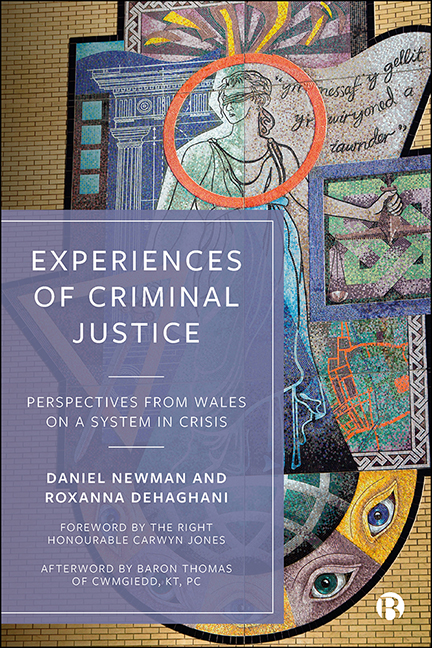Book contents
- Frontmatter
- Contents
- List of Figures and Tables
- Foreword
- Acknowledgements
- 1 Why Wales?
- 2 A System in Crisis
- 3 The People and Their Experiences
- 4 Criminal Justice in Its Place
- 5 Pressures of Practice
- 6 Criminal Justice Relationships
- 7 Navigating the Criminal Justice System
- 8 Doing Criminal Justice Differently
- Afterword
- References
- Index
5 - Pressures of Practice
Published online by Cambridge University Press: 15 September 2022
- Frontmatter
- Contents
- List of Figures and Tables
- Foreword
- Acknowledgements
- 1 Why Wales?
- 2 A System in Crisis
- 3 The People and Their Experiences
- 4 Criminal Justice in Its Place
- 5 Pressures of Practice
- 6 Criminal Justice Relationships
- 7 Navigating the Criminal Justice System
- 8 Doing Criminal Justice Differently
- Afterword
- References
- Index
Summary
Introduction
In the previous chapter we assessed how criminal justice issues played out in south Wales as the location of our study, thus outlining the context of the experiences at the heart of this book. The chapter detailed defining features of the space and the time of this location, such as the relatively small scale of the criminal cases and the impact of austerity on an issue such as court closures. In this chapter we flesh out the specific criminal justice experiences that occurred in south Wales, considering the pressures that practitioners faced in their practice. These pressures frame the experience of practitioners and, in turn, shape the experience of the accused.
Criminal legal aid is subject to lower remuneration levels than other areas of legal practice; criminal legal aid lawyers have typically been viewed as ‘low status’ compared with other lawyers (Sommerlad, 1995; 1996; 2001). Those practising in legally aided criminal defence work are becoming increasingly deprofessionalized in relation to the tasks that they must undertake and their role in relation to the court. They are required to engage with increasingly formulaic processes; restrictions are placed on the initiative that they may seek to take. Their remuneration has stagnated and been reduced; the financial value placed on their work is limited. Within these circumstances, legally aided criminal defence lawyers have been labelled ‘alienated workers’ (Newman, 2016b; Newman and Welsh, 2019); their diminishing profession attracts little wider respect and internalizes negative messages. Alienated workers may feel powerless and time deprived, making their work inherently more stressful (Boni-Le Goff et al, 2020). Within this chapter we consider, in more depth, the issues deemed to be central to understanding the experiences of criminal justice. We address specifically the challenges that practitioners face within their practice. These challenges – presented through the frames of ‘time’ and ‘money’ – are inextricably linked. Owing to the pressures of practice caused by years of neoliberal and austerity-driven policies (as discussed in Chapter 2), the lawyers in this study had little of either. They were paid insufficiently for essential work, they felt pressure to work quickly to compensate for the insufficient fees payable, and they were bothered by what they perceived as undue encumbrances on their time. The nature of legal aid work required practitioners to work faster or, in the euphemistic language of the government and the courts, as efficiently as possible.
- Type
- Chapter
- Information
- Experiences of Criminal JusticePerspectives from Wales on a System in Crisis, pp. 110 - 140Publisher: Bristol University PressPrint publication year: 2022



